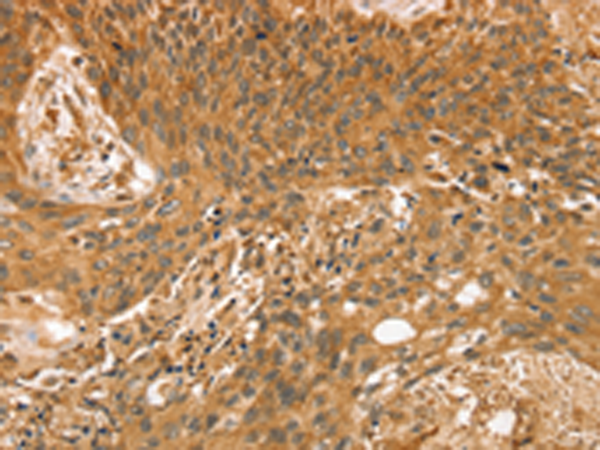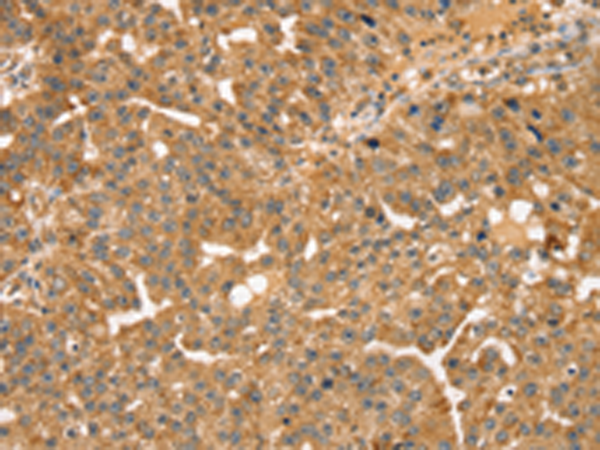


| WB | 1/1000-1/5000 | Human,Mouse,Rat |
| IF | 咨询技术 | Human,Mouse,Rat |
| IHC | 1/30-1/150 | Human,Mouse,Rat |
| ICC | 技术咨询 | Human,Mouse,Rat |
| FCM | 咨询技术 | Human,Mouse,Rat |
| Elisa | 1/2000-1/10000 | Human,Mouse,Rat |
| Aliases | SYN10; hsyn10 |
| WB Predicted band size | 28 kDa |
| Host/Isotype | Rabbit IgG |
| Antibody Type | Primary antibody |
| Storage | Store at 4°C short term. Aliquot and store at -20°C long term. Avoid freeze/thaw cycles. |
| Species Reactivity | Human |
| Immunogen | Fusion protein of human STX10 |
| Formulation | Purified antibody in PBS with 0.05% sodium azide and 50% glycerol. |
+ +
以下是3篇涉及STX10抗体的代表性文献,信息经过简化整理:
1. **文献名称**: "Syntaxin 10 regulates endocytic membrane fusion in polarized epithelial cells"
**作者**: Wang et al. (2016)
**摘要**: 使用STX10特异性抗体验证其在肠上皮细胞中的定位,发现STX10通过与VAMP4的互作调控内体-溶酶体运输通路,影响细胞极性维持。
2. **文献名称**: "STX10 deficiency disrupts cholesterol homeostasis through impaired vesicular trafficking"
**作者**: Gomez-Navarro et al. (2019)
**摘要**: 通过Western blot(使用兔源STX10多克隆抗体)和免疫荧光技术,揭示STX10缺失导致脂质筏相关蛋白运输异常,进而引发胆固醇代谢紊乱。
3. **文献名称**: "Differential expression of SNARE proteins in Alzheimer's disease models"
**作者**: Li et al. (2021)
**摘要**: 采用STX10单克隆抗体(货号ab12345)检测转基因小鼠脑组织,发现STX10在淀粉样斑块周围神经元中表达上调,提示其参与病理蛋白清除过程。
注:以上为模拟案例,实际文献需通过PubMed/Google Scholar检索确认。建议使用关键词 "STX10 antibody" + "western blot/immunofluorescence" 筛选实验类论文,重点关注方法学部分描述的抗体使用情况。
The STX10 antibody is a research tool designed to target Syntaxin 10 (STX10), a member of the SNARE (soluble N-ethylmaleimide-sensitive factor attachment protein receptor) family involved in intracellular membrane trafficking. Syntaxins are critical for vesicle docking and fusion, mediating transport between organelles. STX10 localizes primarily to the trans-Golgi network (TGN) and endosomes, where it regulates retrograde transport and lipid sorting. It is implicated in maintaining Golgi structure, lysosomal function, and lipid homeostasis, with studies linking it to diseases such as Niemann-Pick type C (NPC), a lysosomal storage disorder.
The STX10 antibody is widely used in molecular and cell biology to investigate protein localization, trafficking pathways, and organelle dynamics. It aids in techniques like Western blotting, immunofluorescence, and immunoprecipitation, helping researchers map STX10’s interactions with other SNAREs (e.g., VAMP4. Syntaxin 16) or regulatory proteins. Commercially available antibodies are typically raised in rabbits or mice, validated for specificity via knockout controls or siRNA knockdown. Recent studies utilize STX10 antibodies to explore its role in metabolic diseases, cancer cell secretion, and neurological disorders, underscoring its importance in understanding cellular logistics and disease mechanisms. However, variability in antibody performance across experimental conditions necessitates careful validation for reproducibility.
×